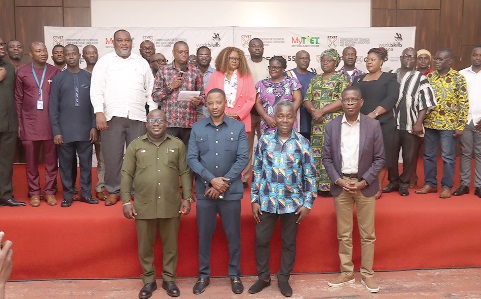adverts
The Commission for Technical and Vocational Education and Training (CTVET) has inaugurated four new Sector Skills Bodies (SSBs) to support its efforts in promoting technical and vocational education (TVET) in Ghana.
These SSBs, made up of industry professionals, academics, and policymakers, will provide expert advice on curriculum development, skill enhancement, and policies to ensure TVET aligns with market needs.
The new SSBs cover four vital sectors: telecommunications; environment, sanitation, and waste management; media and entertainment; and electrical, automation, and electronics. With these additions, a total of 16 SSBs have been established since the initiative began in 2019, and six more are planned for future development.
adverts
The Deputy Minister of Education in charge of TVET, Professor Kingsley Nyarko, inaugurated the new bodies in a ceremony held in Accra.
Speaking at the event, Prof. Nyarko emphasised the crucial role of TVET and STEM (Science, Technology, Engineering, and Mathematics) in driving national development and economic prosperity.
“In today’s world, no country can rely solely on the public sector for economic growth. Prosperous nations have invested heavily in TVET and STEM education,” Prof. Nyarko stated.
He also highlighted the government’s significant investment in TVET, including the Free TVET Education initiative, the refurbishment of TVET institutions nationwide, and the construction of 32 modern TVET facilities, of which nine are currently in progress.
This investment has resulted in a surge in TVET enrolment, with 60,000 students enrolling in government-run TVET institutions for the 2023/2024 academic year—an increase of over 300% from the 20,000 enrolments in 2017.
“The total enrolment in government TVET institutions has now reached 157,681, thanks to interventions such as the Free TVET initiative and the ‘MyTVET’ campaign, aimed at changing negative perceptions about vocational education in Ghana,” he added.
Prof. Nyarko further stressed that the success of TVET hinges on industry support to provide practical training and real-world skills to students.
He praised the establishment of the SSBs, describing them as a bridge between industry and academia, ensuring students are equipped with the necessary skills to thrive in both local and global job markets.
Dr. Fred Kyei Asamoah, Director-General of CTVET, echoed the Deputy Minister’s sentiments, noting that the SSBs play a pivotal role in TVET education by aligning it with industry standards. “The launch of the Sector Skills Bodies is a critical step in formalising and strengthening collaborations. They will serve as a platform for ongoing dialogue between industry and educators, providing real-time data on the workforce’s evolving needs,” Dr. Asamoah explained.
The formation of these new advisory bodies underscores CTVET’s commitment to strengthening the partnership between TVET institutions and industry. By providing insights into market trends and skills requirements, these SSBs will help shape a curriculum that prepares students to meet the demands of a dynamic job market, ensuring a more robust and industry-relevant TVET system in Ghana.


